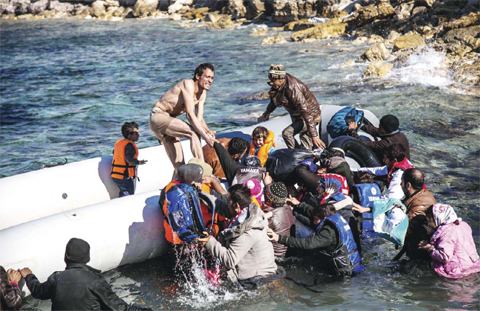 CESME: Migrants and refugees walk towards a dinghy to travel to the Greek island of Chios from Cesme in the Turkish province of Izmir yesterday. Nearly 500 people have died trying to cross the Aegean Sea from neighboring Turkey this year, many of them in the narrow but treacherous stretch separating Lesbos from Turkey. — AFP
CESME: Migrants and refugees walk towards a dinghy to travel to the Greek island of Chios from Cesme in the Turkish province of Izmir yesterday. Nearly 500 people have died trying to cross the Aegean Sea from neighboring Turkey this year, many of them in the narrow but treacherous stretch separating Lesbos from Turkey. — AFP
BRUSSELS: European Union interior ministers faced renewed pressure to deliver on their promises for tackling the migration crisis yesterday as they met to prepare the ground for a crucial summit with African leaders. Dimitris Avramopolous, the EU migration commissioner, urged them to act quickly on pledges to tighten external borders, relocate refugees from overstretched Italy and Greece, and set up reception centers along the main Balkans route from Greece.
Yesterday's extraordinary meeting came ahead of a special EU-Africa summit in Malta on Wednesday, focused on how to reduce the flow via Libya, the second-busiest migrant route after Turkey and the Balkans. "It is now time for them (the member states) to accelerate the work to make these promises a reality on the ground," the commissioner, a Greek national, said in a statement. The European Commission, the executive arm of the 28-nation EU, proposed a multi-pronged plan in May to tackle the worst migrant crisis in Europe since the Second World War after nearly 800 migrants drowned in the Mediterranean on their way to Italy via Libya.
The problem worsened over the summer when hundreds of thousands more people fleeing wars in Syria, Iraq and Afghanistan arrived in Greece and the Balkans via Turkey. More than 3,000 people have drowned among the nearly 800,000 who have reached Europe this year. However, EU states have bickered for months over a joint solution, particularly over plans to relocate a total of 160,000 asylum seekers from frontline countries to other parts of the bloc.
"We need to see more relocations from Greece and Italy as a matter of urgency," said Avramopoulos. The EU finally approved the relocation schemes last month in the face of fierce opposition from Hungary and other eastern member states who are grappling with an anti-immigrant backlash. But since then only around 120 asylum seekers have been relocated from Italy and Greece to countries like Sweden and Luxembourg.
'Time for delivery'
States like Hungary are putting pressure on Greece to reinforce its sea borders, the first EU port of call on the dangerous Aegean Sea crossing from Turkey. Avramopolous said member states also need to contribute the staff and equipment needed to set up the agreed reception centers in Greece and Italy where people seeking refugee status will be separated from economic migrants who will be sent back home. There are also plans to set up reception centers in the Balkan countries where migrants can register and obtain shelter. "We need to increase reception capacities," Avramopoulos added.
He also called for speeding up the return of economic migrants to their home countries. "Now is the time for delivery on all fronts," he said. The gathering of more than 50 leaders from both the EU and Africa in Malta on Wednesday and Thursday will see an overwhelmed Europe call on Africa to take back more people classed as economic migrants and not refugees fleeing conflict and persecution. In return, Europe will offer up to 3.6 billion euros ($3.8 billion) in development funds in a fresh thrust by the wealthy EU to tackle the wars and poverty in Africa that are among the root causes of the migration flow.
In Vienna meanwhile, ministers and senior officials from 11 European countries including Germany and Sweden met yesterday to discuss how to better integrate the record numbers of migrants. Sebastian Kurz, integration and foreign minister of hosts Austria, said the integration of migrants into mainstream society was essential to maintain "social harmony" in European countries where people are "unsettled" by the influx. In Cyprus, British officials said yesterday that 114 migrants from the Middle East staying at a military base on the east Mediterranean island will be deported if they do not claim asylum with the Cypriot authorities.- AFP

